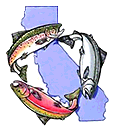Reconnecting with Resilience
April 19 - 22, 2022
Hydrologic Management for the Anthropocene
22 April 2022
9:00am - 12:15pm
Session Coordinators: David Dralle, PhD, Pacific Southwest Research Station, Forest Service, and Tim Bailey, Watershed Research and Training Center
A climate emergency is upon us. Salmon and their watersheds face extremes in flow and water temperature due to more frequent drought, extreme heat, flooding, wildfire, and reduced snowpack. Novel, science-based strategies are needed to maintain a place for cold water fish in our landscapes. This session is an opportunity to disseminate basic and applied scientific knowledge that will help to advance management practices for the betterment of salmon-supporting watersheds. This is a venue for practitioners from a variety of roles to report on their efforts. Approaches to enhance instream flow, improve water quality, and augment beneficial environmental conditions are encouraged to participate.
A Hydrologic Baseline for Quantifying Groundwater Contribution to Flows Supporting Critical Salmonid Rearing – Accretion in the San Lorenzo River System, Santa Cruz County, California, Barry Hecht, CHG, CEG, Balance Hydrologics
A Hydrospatial Approach to Measure Habitat Availability for Tidal Wetland Fishes, David E. Ayers, UC Davis
California’s Stream Gaging Plan, Priorities for Future Gaging, and Analysis Tools, Valerie Zimmer, State Water Resources Control Board
EcoFIP: An Enhanced Method for Evaluating Large-scale, Multi-objective Floodplain Restoration Opportunities, Luke Tilllmann, MS, cbec eco engineering
Notes from Underground: The Hydrological Underpinnings of Watershed Response to Drought Across California, David Dralle, PhD, Research Hydrologist, Forest Service
Thermal Stratification of River Pools – Field and Numerical Modeling Study, Todd H. Buxton, PhD, Bureau of Reclamation
A Hydrologic Baseline for Quantifying Groundwater Contribution to Flows Supporting Critical Salmonid Rearing – Accretion in the San Lorenzo River System, Santa Cruz County, California, Barry Hecht, CHG, CEG, Balance Hydrologics
